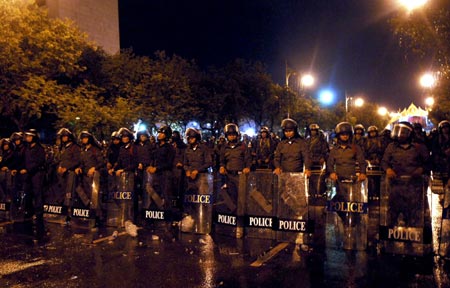Thai Prime Minister Samak Sundaravej on Tuesday morning announced to impose a state of emergency in Bangkok following violent clashes between the pro and anti-government protesters in early morning.

|
|
Riot policemen separate the two sides of clashes in Bangkok, capital of Thailand, early Sept. 2, 2008. Fierce clashes erupted between thousands of pro-government and anti-government protestors in Bangkok early Sept. 2, leaving at least three people dead and more than 20 others injured. [Xinhua Photo]
|
The premier made the announcement at 7:00 a.m. Tuesday (2400 GMT, Monday) through TV pool and radio broadcasters nationwide, after confrontations between pro-government demonstrators led by the Democratic Alliance Against Dictatorship (DAAD) and anti-government protesters led by the People's Alliance for Democracy (PAD) left at least one person dead and dozens injured during the first two hours of Tuesday near the Government House compound, which the PAD supporters have occupied since Aug. 26.
Samak cited disturbances to law and order in the capital brought by some groups as the reason to enforce the Emergency Decree on Public Administration in Emergency Situations in Bangkok.
The premier will hold a press conference at 9:00 a.m. (0200 GMT) at the Supreme Command headquarters to explain his decision.
The order also put the Army Chief in charge of enforcing the emergency decree in Bangkok.
The imposition of emergency decree means security in the capital will be immediately taken over by the Internal Security Operations Command (ISOC), headed by premier Samak and practically run by the army.
This is the first time enforcement of the Emergency Law since the new Constitution was passed by the junta which governed the country after the Sept. 19, 2006 bloodless military coup that ousted then premier Thaksin Shinawatra.
The state of emergency prohibits gathering of more than five people.
The Bangkok Metropolitan Administration announced later that the 436 schools in Bangkok will be closed for three days.
A DAAD spokesman immediately said that they would follow the law and end its rally at Sanam Luang (Royal Field) in central Bangkok, while the PAD vowed to carry on their protest.
One PAD core leader Chamlong Srimuang quickly took the rally stage inside the Government House compound shortly after Samak declared a state of emergency, telling the PAD supporters to remain at the rally site.
He assured the protesters, many of them women and senior-aged persons, of their safety and liberty, saying that Samak could only arrest the PAD leaders at most by imposing the emergency law. "There won't be enough prisons for us," he said.